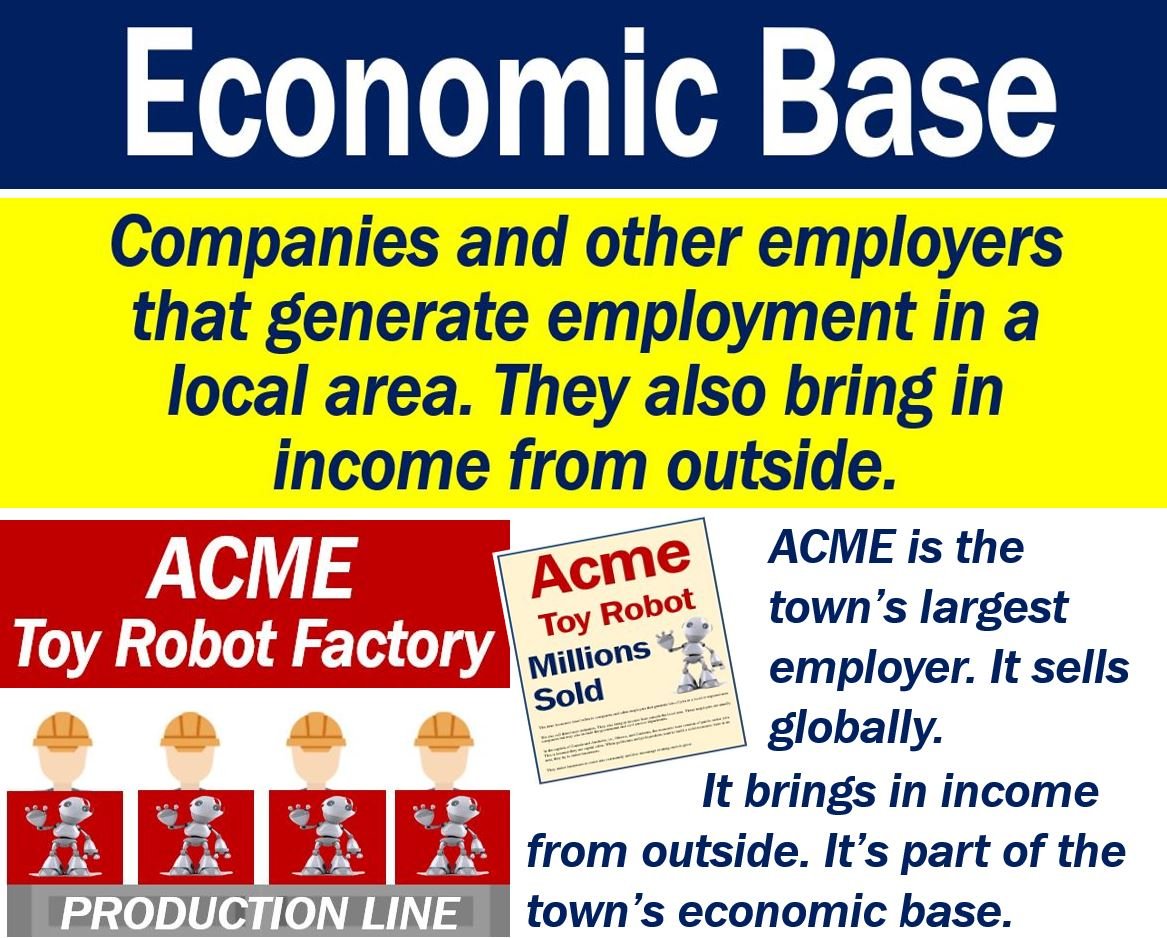What is economic base? Definition and examples
The term ‘Economic Base’ refers to companies and other employers that generate lots of jobs in a local or regional area. We also call them basic industries. An area’s economic base is pivotal, as it often dictates the overall economic health and growth potential of the community.
They also bring in income from outside the local area. These employers are usually companies but may also include the government and civil service departments. In the capitals of Canada and Australia, i.e., Ottawa, and Canberra, the economic base consists of public sector jobs.
When politicians and policymakers want to build a solid economic base in an area, they try to entice businesses. They entice businesses to come into the community and also encourage existing ones to grow.
Economic base analysis
Economic base analysis is a method for identifying which industries are key to a regional or local economy.
Economists and policymakers use economic base analyses to help when deciding on workforce targeting and economic development. Economic development, apart from GDP growth, also includes improvements in life expectancy, health, literacy, and access to good housing.
Robert Murray Haig (1887-1953) developed economic base analysis in 1928 in his work on the Regional Plan of New York. He was an American economist who was also famous as an expert on taxation and public finance.
Economic base analysis posits that we can divide activities in an area into two categories: 1. Basic industries. 2. Non-basic industries.

-
Basic industries
Basic industries are those that sell to customers outside the local area. They bring in wealth from outside. We also refer to them as the ‘economic base.’
Basic industries provide services to companies and people outside the local area. They bring money into the local area.
For example, Canada’s federal government in Ottawa provides services for Canadians across the country.
-
Non-basic industries
Non-basic industries support the basic ones. They do not provide services to businesses and people outside the community or local area.
Non-basic industries do not bring in money from outside.
“Economic base analysis is a theory that posits that activities in an area divide into two categories: basic and nonbasic. Basic industries are those exporting from the region and bringing wealth from outside, while nonbasic (or service) industries support basic industries.”
Examples
-
Basic industry or economic base
John Doe Commercial Fruit Orchard grows huge amounts of fruit inside the local area.
Locals buy and consume some of those fruit. However, people in other parts of the country and even abroad buy most of it.
John Doe ships to outside communities, which subsequently provides growth in the local economy.
John Doe Commercial Fruit Orchard forms part of the economic base, i.e., it is a basic industry.
-
Non-basic industry
ACME Glistening Windows is a company that cleans people windows. One hundred percent of all ACME’s income comes from local residents.
It is a non-basic industry. It does not bring in wealth from outside. Neither does it provide a service or goods to outside people or companies. The word ‘goods,’ in this context, means ‘products.’
Non-basic industries are essential for the local economy as they provide the goods and services necessary for the daily lives of the community residents.
Compound nouns with “economic base”
In business and economics English, there are many compound nouns containing the term “economic base.” Compound nouns are terms consisting of two or more words. Let’s take a look at some of them, their meanings, and how we can use them in a sentence:
-
Economic Base Analysis
A tool used to assess the stability and growth potential of a region’s economy.
Example: “The city’s council commissioned an economic base analysis to inform their development strategy.”
-
Economic Base Expansion
The process of growing a region’s primary industries to bolster the local economy.
Example: “The mayor’s initiative focused on economic base expansion to attract more tech companies to the area.”
-
Economic Base Diversification
Broadening the range of dominant industries in a local economy to reduce reliance on a single sector.
Example: “Economic base diversification is crucial for our town to thrive in the ever-changing global market.”
-
Economic Base Theory
A theoretical framework explaining how the economic base impacts a region’s economic health.
Example: “Scholars debated the implications of economic base theory at the annual economics conference.”
-
Economic Base Model
A structured representation of how basic industries support and drive a local economy.
Example: “Urban planners used an economic base model to predict the impact of the new manufacturing plant.”
-
Economic Base Data
Statistical information pertaining to the core industries of a regional economy.
Example: “Analysts reviewed the economic base data to gauge the potential for job creation.”
-
Economic Base Study
A detailed investigation into the key sectors that form the foundation of a local economy.
Example: “The economic base study revealed tourism and agriculture as the pillars of the island’s economy.”
Video – What is an Economic Base?
This educational video, from our sister channel on YouTube – Marketing Business Network, explains what an ‘Economic Base’ is using simple and easy-to-understand language and examples.

